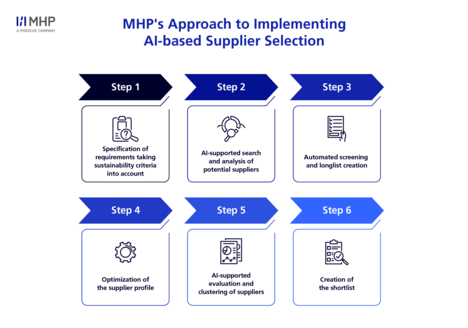
- Blog, Engineering & Production
- Published on: 09.09.2024
- 12:15 mins
Sustainable Supply Chains: Does AI Play a Role in Determining the Success of Supply Chain Management Sustainability Goals?
The growing awareness of environmental issues in society at large coupled with increasing pressure from stakeholders means that companies need to prioritize sustainability in supply chain management. In addition to the legal regulations concerning reducing carbon emissions, global disruptors such as the growing shortage of skilled workers and the increasing frequency of natural disasters are forcing companies to make their supply chain management more resilient in order to ensure continuous business operations. Many companies are now facing the challenge of achieving effective and efficient sustainable supply chains and associated sustainability goals.
Climate change, global pandemics and political instability are all making disruptions and shortfalls in global supply chains more and more likely. AI and sustainable practices can be used to adapt the chain of processes to create a stable and resilient supply chain. Companies with limited resources and those in polluting industries stand to benefit significantly from AI solutions.
In this blog, we take a comprehensive look at the different areas of application for supply chain AI as well as the associated economic benefits and challenges that it entails. Furthermore, you will learn how MHP can support you when it comes to the strategic development and implementation of AI to achieve your sustainability goals.
Artificial intelligence (AI) is becoming increasingly important within this context. Yet many are hesitant when it comes to investing in the technology – for example, due to the uncertain return on investment (ROI). The key question here is: how can AI contribute to achieving sustainability goals within the supply chain?
Green Transition, Green Tech and Green AI – an Explainer
Terms such as green transition, green tech and green AI are often used in discussions about climate change and the related focus on sustainability issues. Green transition – also known as the green transformation – refers to the comprehensive transformation of the economy and society as a whole to sustainable and environmentally friendly practices with the aim of securing a sustainable future. Green tech – also known as green technologies – is required to make this sustainable transformation a reality. This green tech aims to minimize the environmental impact of human activities, to utilize resources more efficiently, and to promote sustainable solutions along the value chain.
Green AI also falls under the umbrella of green tech. This type of artificial intelligence is designed to support sustainable practices and to minimize the environmental footprint of technology. It can be divided up into the following two main aspects:
- AI for sustainability: Green AI can help companies to optimize the use of their resources, to reduce emissions, to improve recycling processes, and to monitor compliance.
- Sustainable AI: Green AI also includes optimized algorithms, which help to reduce the energy required to process data. The focus here is on methods to improve the environmental performance of AI-supported systems.
Supply chain AI is another term that is used within the context of green AI. Supply chain AI refers to AI technologies that are specifically used to optimize and automate supply chain processes. These technologies don’t just improve the efficiency and responsiveness of the entire supply chain, they also support sustainable practices within this specific field.
Supply Chain AI: Areas of Application and Benefits for Implementing Sustainability Goals
Sustainability has become a central pillar of a successful business strategy. Artificial intelligence can be used to specifically promote environmentally-friendly practices. In the section below, we provide an overview of the areas in which AI can make your supply chain more sustainable.
Reducing the environmental impact
AI-powered systems play a decisive role when it comes to reducing the impact of processes on the environment, as they can monitor and optimize energy consumption in production and storage facilities, for example. Energy data is analyzed to identify and adapt inefficient processes. The result: considerable energy savings and a reduction in carbon emissions.
At the same time, AI facilitates an efficient use of resources through precise demand forecasting to minimize overproduction and waste. In addition, these technologies are able to improve your management of raw materials by supporting predictive plant maintenance and optimized transport routes. This not only reduces carbon emissions but also improves the overall environmental footprint of your supply chain.
Furthermore, AI sustainability systems can help you to identify and minimize pollution throughout the supply chain. By analyzing and monitoring emissions and waste streams, companies can take targeted measures to reduce their impact on the environment.
Implementing regulations and compliance
The increasing and constantly changing regulations are another dimension that makes it increasingly difficult for companies with a global supply chain to keep track. AI can help companies to stay informed about existing or planned regulations in the different countries in which they operate.
At the operational and tactical level, artificial intelligence can also help to calculate emissions along the supply chain and implement automated monitoring. AI can, for example, facilitate adherence to the German Supply Chain Act (Lieferkettensorgfaltspflichtengesetz or LkSG) by providing automated monitoring, documentation and reporting to comply with the environmental standards and regulations. This in turn makes reviewing compliance more efficient and precise, while potential breaches can be quickly identified and remedied. AI systems monitor large amounts of data from a range of sources on a continuous basis and identify deviations from the specified standards in real-time. As such, implementing AI is a decisive factor when it comes to keeping abreast of the latest developments and proactively complying with statutory requirements.
The LkSG (Lieferkettensorgfaltspflichtengesetz) is a German law that was passed in 2021 and came into force on January 1, 2023. It aims to strengthen and set out in stone the human rights and environmental due diligence obligations of companies along their supply chains. The law requires companies to identify, evaluate and minimize the risks posed to human rights and the environment along their global supply chains.
You can find further information on this topic in our blog on the LkSG. Implementing AI within your company allows you to achieve your regulatory and compliance objectives faster and more cost-effectively.
The Economic Benefits of AI Solutions
In addition to the advantages described above, AI solutions also offer a number of economic benefits. In concrete terms, green AI means:
Less downtime thanks to predictive maintenance
By using AI for predictive maintenance, you can reduce downtime and maintenance costs and can avoid potential failures before they even occur. It also gives you access to real-time data analysis for more efficient production planning.
More precise data capture and analysis
By integrating IoT sensors (“Internet of Things”) and AI, you can monitor and analyze your supply chain in real-time. This includes preventative risk and event-driven logistics management to avoid additional trips in logistics, as well as identifying inefficient processes, patterns and trends, and using these to derive recommended actions and measures based on the environmental and sustainability data.
Securing your competitive advantage
Sustainable and efficient business processes significantly increase your competitiveness. AI has the potential to promote innovations with automation creating space for innovative and creative solutions. The result: your company can remain flexible and can respond and react to dynamic market conditions and regulatory requirements.
A boost to your company image
AI can also have a positive impact on the image your company portrays – supply chain management sustainability actively contributes to a positive brand image and allows you to differentiate yourself from the competition. As a company that utilizes AI to boost sustainability and compliance in the supply chain, you can position yourself as a pioneer in the competitive market environment. Porsche, Audi and Volkswagen all use artificial intelligence to analyze messages relating to suppliers on public platforms to minimize sustainability risks within the supply chain at an early stage.
Furthermore, transparent and environmentally-friendly practices serve to further increase customer satisfaction and loyalty.
Challenges Associated with Artificial Intelligence
Although artificial intelligence allows for more efficient and agile supply chain management, companies are confronted with a series of complex challenges that need to be overcome in order to successfully navigate the switch to AI.
- Data quality and verification: One of the greatest challenges concerns ensuring that the data that is fed into the AI systems is both precise and structured. Companies often have to clean, normalize and substantiate erroneous, incomplete or outdated data sets from heterogeneous sources and systems in order to create a consistent and reliable set of data.
- Complexity and costs: Implementing AI solutions can involve high costs and technical requirements. Taking a detailed look at your individual requirements and the specific use case is decisive when it comes to ensuring the long-term value of these investments. In light of the increasing shortage of skilled workers, the application of AI and the associated employee training will become indispensable over the long term.
- Scalability and flexibility: Companies must ensure that their AI solutions are scalable and flexible enough to keep pace with the changing requirements and trading conditions. This requires a system architecture that can be easily expanded, and the ability to respond to new data sources and market conditions. Scalable systems allow companies to grow without becoming any less efficient and without their performance being hampered.
- System integration: Integrating AI into existing IT infrastructures can be quite the challenge. The new AI systems must be able to interact seamlessly with existing ERP, CRM and other company software to guarantee the maximum benefit. Successful integration does not just demand technical expertise; IT departments and specialist departments must work closely together to ensure that the AI solutions meet specific business needs.
How MHP Can Support You in Achieving Your Supply Chain Management Sustainability Goals
In the section below, we present one of our most common use cases to give you a more detailed insight into how we can help you integrate AI solutions into your supply chain.
Use case: AI-based solutions to optimize sourcing
Searching for suitable suppliers who meet all of the requirements, adhere to ESG criteria and fulfill all the sustainability aspects is a resource-intensive process that demands extensive data collection and analysis. This stage of sourcing ties up valuable resources and personnel, which in turn leads to high costs. In addition, companies often limit themselves to their existing suppliers without considering an extensive evaluation of potential new suppliers, who may be more attractive in terms of sustainability in a comparative analysis. This limited transparency restricts the potential for optimization along the supply chain.
MHP’s approach to the (partial) automation of the search for suppliers
In order to overcome this challenge, here at MHP we utilize a text-based supplier search based on an AI-powered requirement management system. These AI solutions are designed to accurately identify the procurement scope specifications and to perform both internal and external searches for relevant suppliers. The systems utilize algorithms that search through text on the internet, including news feeds, and that screen the existing supplier portfolio. These systems can also be integrated into your existing business systems for seamless integration within your operating processes.
An overview of our approach to effective supplier selection
In order to implement an AI-based supplier search, you first need a detailed list of requirements that takes the latest sustainability regulations into account. This list of requirements is used to screen all available data – both from your internal supplier portfolio and from the entire internet – for potential suppliers. We then create an initial list of 20 to 50 suppliers, including all of the relevant information, for an initial evaluation.
AI tools are then used to focus on the original requirements in order to create a target supplier profile based on combinatorial analysis and associated keywords. These criteria are then used to evaluate the suppliers and to classify them as suitable and less suitable candidates. The final list comprises five to ten suppliers including a ranking to indicate the best fit. This list also includes all of the key information relating to the company and additional factors, which can be used as a basis for decision-making.
How you can benefit from AI-powered supplier search
Utilizing advanced AI algorithms allows you to analyze large quantities of data with great efficiency and to reach relevant results in a short space of time. This in turn means that you can benefit from more precise supplier recommendations, which have been specifically tailored to your company’s requirements. These AI systems are also scalable so they can be adapted to changing business requirements, regardless of the size and complexity of your supplier landscape.
In addition, the automated, AI-powered search process frees up the time of your procurement staff so they can apply their human expertise to other value-generating tasks. This serves to cut personnel costs and the likelihood of making costly incorrect decisions relating to suppliers.
Summary: Successfully Utilize AI for Supply Chain Sustainability with the Help of MHP
Investing in AI for your supply chain is no longer optional. The benefits massively outweigh the challenges concerning data quality and technical complexity. AI increases resilience, reduces costs and improves efficiency within your processes, while also ensuring adherence to the increasing regulatory requirements.
We offer a holistic end-to-end supply chain consulting process to help you overcome challenges and integrate AI into your company processes to boost your profitability. MHP is here to support you at every stage – from drawing up the strategy, to implementation, to putting your supply chain management sustainability into practice. Our extensive expertise and many years of experience put us in the perfect position to help you find the best AI solution to meet your specific use case within your supply chain.
FAQ
Artificial intelligence can play a decisive role in promoting climate neutrality in the supply chain. AI-supported algorithms make it possible to analyze and optimize the entire supply chain. As a result, companies can utilize precise prognoses and inventory management to avoid overproduction and excess stock. In addition, AI can help you to select and evaluate sustainable suppliers. AI-based systems are also able to monitor emissions on a continuous basis and generate reports.
Sustainable AI is the development and application of artificial intelligence that is socially, economically, and ecologically responsible. The aim is to create systems that utilize resources efficiently, have minimal environmental impact and adhere to ethical standards. Sustainable AI also promotes fairness and transparency within its algorithms to ensure social justice and to have a long-term positive impact.
Green AI can reduce the environmental impact of AI systems through more efficient algorithms that consume less computing power and energy. Green AI promotes the development of technology focused on sustainability, for example through optimized energy consumption in different sectors or through improved environmental monitoring systems. In addition, green AI can help reduce the digital carbon footprint and, as such, play a key role in protecting the climate and achieving global sustainability goals.
Artificial intelligence can optimize processes in companies through automation and precise data analysis, which in turn leads to more efficient processes and lower resource consumption. As such, it enables precise forecasting of demand and maintenance requirements, which serves to reduce overproduction and unnecessary expenditure, while also increasing the service life of machinery and equipment. By using AI in logistics and the supply chain, routes and warehousing can be optimized to reduce emissions and minimize energy consumption. This in turn increases efficiency while cutting a company’s carbon footprint.







